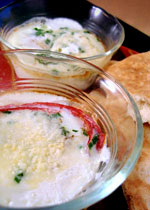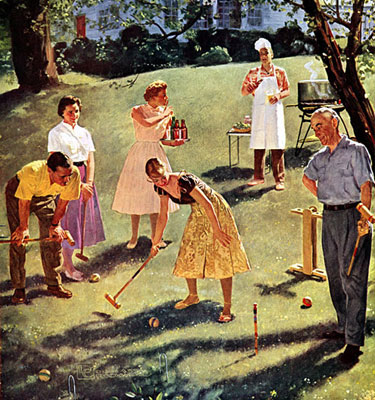 Back in 1990, rice and love became forever entwined in my mind. A man I’d gone out with for ten years broke off our relationship...and my response to grief was to learn how to make risotto. After I taught myself to make proper risotto, I went on a blind date with an Italian, and some time later found myself in Florence, seeking the approval of my future mother-in-law, whose favorite dish was risotto. Rice and love. From a distance of twenty years, the emotion and the starch wind around each other with all the choreographed beauty of ballet.
Back in 1990, rice and love became forever entwined in my mind. A man I’d gone out with for ten years broke off our relationship...and my response to grief was to learn how to make risotto. After I taught myself to make proper risotto, I went on a blind date with an Italian, and some time later found myself in Florence, seeking the approval of my future mother-in-law, whose favorite dish was risotto. Rice and love. From a distance of twenty years, the emotion and the starch wind around each other with all the choreographed beauty of ballet.
The year of my great misery I was living in a tiny apartment in the graduate ghetto of New Haven, Connecticut. Most of the space was in the kitchen, which I found inspirational. I spent my free time cooking, crying and reading. My favorite cookbook was Paul Bertolli’s Chez Panisse Cooking, a tome with long fervent essays that included a long piece on risotto. I would stand over the pot, stirring as Paul instructed, reading a romance borrowed from the public library, and crying every now and then when it seemed the heroines had a better life than I did. After a month or two of this, I was quite good at risotto and I started to think about men in a more cheerful manner, which led to a blind date with Alessandro, a graduate student in Italian with loopy black curls and a swimmer’s body. He liked my risotto. It wasn’t until years later, when I ate his mother’s creamy, delicious risotto, that I understood how important it was.

 Yesterday morning, I stood at the entranceway to our living room and surveyed the damage. There were stacks of books and magazines on the coffee table, tumbles of blankets on the couch, a smattering of empty mugs with used tea bag strings dangling over their rims. My abandoned crutches were leaning on the door, my physical therapy CPM machine on the floor.
Yesterday morning, I stood at the entranceway to our living room and surveyed the damage. There were stacks of books and magazines on the coffee table, tumbles of blankets on the couch, a smattering of empty mugs with used tea bag strings dangling over their rims. My abandoned crutches were leaning on the door, my physical therapy CPM machine on the floor.  I got sick last week. Sick like “Oh my god, I’m never going to walk again.” Sick like, “Should I go to hospital now?” Sick like stomach virus. out sick Liquid Alison. It was the worst, though luckily it moved through me quickly, so to speak. After hours of sleeping cocoon-style on the couch, I realized I would have to put something into my body. I stood in my kitchen, staring at my shelves, wrapped in a blanket, moaning slightly as my dogs rolled their eyes. It had to be simple to make and easy to eat. My eyes scanned the shelves: quinoa, polenta, whole wheat penne, vermicelli, and then focused on a box of small shells, half of which I had cooked for a child’s mac and cheese a long time ago. That I could do. Pasta is easy.
I got sick last week. Sick like “Oh my god, I’m never going to walk again.” Sick like, “Should I go to hospital now?” Sick like stomach virus. out sick Liquid Alison. It was the worst, though luckily it moved through me quickly, so to speak. After hours of sleeping cocoon-style on the couch, I realized I would have to put something into my body. I stood in my kitchen, staring at my shelves, wrapped in a blanket, moaning slightly as my dogs rolled their eyes. It had to be simple to make and easy to eat. My eyes scanned the shelves: quinoa, polenta, whole wheat penne, vermicelli, and then focused on a box of small shells, half of which I had cooked for a child’s mac and cheese a long time ago. That I could do. Pasta is easy. My ideal breakfast is baked eggs, a nice thick ham steak and wondrously high popovers, this is the food that makes Sunday mornings so special and different from the other 6 days. Sundays are the time to slowdown and reflect on your week and your loved ones in your non formal pajamas for hours. A nice and slow day...
My ideal breakfast is baked eggs, a nice thick ham steak and wondrously high popovers, this is the food that makes Sunday mornings so special and different from the other 6 days. Sundays are the time to slowdown and reflect on your week and your loved ones in your non formal pajamas for hours. A nice and slow day... The happy childhood goes like this: My mother unwraps the silver boxes
of cream cheese as if they are presents. She beats the soft cheese –
the crack of eggs, a dust-storm of sugar – into pale snowbanks in the
bowl while she lets me crush the graham crackers with a hammer. I sneak
a few butter-laced crumbs and, later, watch the cooling cheesecake with
that wistful ache children can have about certain foods. Such moments,
repeated through the years, transform simple favorites into profound
emblems.
The happy childhood goes like this: My mother unwraps the silver boxes
of cream cheese as if they are presents. She beats the soft cheese –
the crack of eggs, a dust-storm of sugar – into pale snowbanks in the
bowl while she lets me crush the graham crackers with a hammer. I sneak
a few butter-laced crumbs and, later, watch the cooling cheesecake with
that wistful ache children can have about certain foods. Such moments,
repeated through the years, transform simple favorites into profound
emblems.

